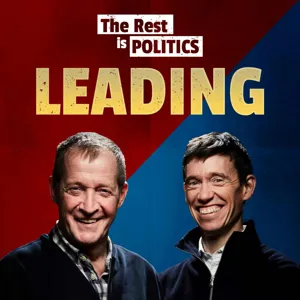Podcast Summary
Democracy under threat: Hillary Rodham Clinton's perspective: Clinton believes democracy is under threat globally due to economic change, cultural shifts, new media, and technology, requiring vigilance and understanding of complex interplay
Learning from Martin Wolf's interview with Hillary Rodham Clinton is that democracy is under threat both in the United States and around the world. Clinton believes this assault on democratic institutions and values is due to a combination of factors including economic change, cultural shifts, new media, and technology. She acknowledges that tension in democracy has always existed, but it's been relatively balanced for a long time. However, the fall of the Soviet Union and the belief in the "end of history" led to a false sense of security. History, Clinton reminds us, never ends, and the current state of democracy requires vigilance and understanding of the complex interplay of various contributing factors.
The rise of anti-elitist, anti-pluralist populism: Populism's rejection of elites and experts leads to a post-truth society where those in power define truth, endangering democratic norms and facts-based decision making.
The rise of populism, specifically the second form which advocates for societal purity and disregard for pluralism and democratic norms, has become a significant force in society. This form of populism often includes a negative reaction towards elites and experts, leading to a post-truth society where those in power get to define truth. This convergence of anti-elitism and anti-pluralism can be seen in various places, such as Hungary's illiberal democracy and old-fashioned fascism. The hostility towards elites and experts is paradoxical, as they are the ones who preserve our welfare and freedom through institutions and facts-based decision making. The current breed of authoritarian populism is characterized by a sense of entitlement and privilege, leading to dangerous and irrational beliefs, such as rejecting scientific evidence on vaccines or promoting unproven remedies.
The Right's Long-Term Strategy: Institutional, Personal, and Ideological Strains: The right's rise to power can be attributed to a long-term strategy combining various institutional, personal, and ideological strains, appealing to unheard and marginalized people, controlling the narrative, and building alliances and institutions.
The current political landscape, particularly the rise of right-wing authoritarianism, can be traced back to a long-term strategy of the right that combines various institutional, personal, and ideological strains. This strategy, which has been in the making for decades, has been effective in appealing to not particularly well-off people by tapping into feelings of being unheard and marginalized. The right's success can be seen in the emergence of media outlets like talk radio and Fox News, which have been entertaining, provocative, and politically aligned with their audience. The right's efforts to control the narrative and decide what's true and what isn't, as seen in Trump's attempt to manipulate inauguration photos, is a manifestation of this overwhelming desire for control that can lead to authoritarianism. The right's success can also be attributed to their ability to build alliances and institutions, such as the unholy alliance between segregationist elements and religious movements, and their efforts to take over the courts to reverse liberal trends. This well-thought-out series of alliances and institution building has come to full fruition in the 21st century.
Trump as a Messenger and Catalyst for Political Change: Trump's long-standing desire for power, narcissism, and ability to communicate effectively made him an ideal figurehead for the anti-immigrant and anti-establishment movements, shifting the political landscape significantly.
Donald Trump is both a messenger and a catalyst for the current political phenomenon in the United States. He had a long-standing desire for power and a narcissistic view of himself, but he was also attuned to the discontent and anxiety in American society. His campaign, with its anti-immigrant and anti-establishment messages, resonated with a certain segment of the population, and he was willing to say or do anything to appeal to them. The Republican Party and conservative elements embraced him, despite his past actions and beliefs that were at odds with their traditional values. Trump's ability to communicate effectively and his strongman persona made him an ideal avatar for this movement. The moment was waiting for a figure like Trump, and he rose to the occasion, shifting the political landscape in significant ways.
Trump's handling of Operation Warp Speed and Democratic approach to globalization: Despite Trump's achievement in leading Operation Warp Speed, his disowning of the initiative due to opposition from his base raises questions about his commitment to expertise and science. Democrats believe expanding trade requires addressing the needs of those negatively impacted.
The Trump presidency's handling of Operation Warp Speed, which led to the rapid development of COVID-19 vaccines, stands out as an achievement from the speaker's perspective. However, Trump's disowning of the initiative due to opposition from his anti-vaccine base raises questions about his allegiance to expertise and science. The Democratic Party's approach to globalization, trade, and cultural changes is also discussed, with the speaker expressing the belief that expanding trade requires addressing the needs of those negatively impacted. The speaker acknowledges mistakes but emphasizes the importance of globalization and freedom. The Democratic Party's successes, despite some setbacks, are highlighted, and the need for addressing the consequences of expanding trade is emphasized.
Cultural fears and divisions in US politics: The US political climate is influenced by economic and cultural factors, with cultural fears and divisions driving significant issues like book bans and restrictions on healthcare and education for marginalized communities, while economic policies and infrastructure investments are also important.
The current political climate in the United States is driven by both economic and cultural factors. While the Democratic Party is making significant strides in addressing economic issues through industrial policies and infrastructure investments, the underlying cultural fears and divisions remain a significant force. These fears manifest in various ways, including efforts to ban books and restrict access to healthcare and education for marginalized communities. The Republican Party capitalizes on these fears by stoking anxiety around issues like immigration and gun control. From a European perspective, the focus on banning books instead of guns may seem irrational, but it reflects the hold that the right-wing alliance has on certain segments of the population. While racism is a significant issue, misogyny may be an even bigger cultural driver, particularly when it comes to reproductive rights. Ultimately, the political pendulum swings back and forth, and Biden's team is in a strong position, but the long road to the election requires continued attention to both economic and cultural issues.
Challenges for Women in Leadership Roles Amplified by Social Media: Social media fuels discrimination, danger, and mental health issues for women in leadership roles, amplifying misogyny and creating a post-truth world. Deep fakes and AI complicate matters, requiring continued efforts to combat discrimination and promote gender equality.
Being a woman in leadership roles, particularly in politics, comes with an additional layer of discrimination and danger, amplified by the pervasive misogyny, both online and offline. Social media has significantly contributed to this issue by fueling populism, racism, homophobia, and misogyny, creating a post-truth world and causing detrimental effects on mental health, especially among young people. The age of deep fakes and artificial intelligence further complicates matters, making it harder to distinguish truth from falsehood. The international spread of anti-democratic messages by autocratic regimes adds to the complexity of the situation. Overall, these challenges underscore the need for continued efforts to combat discrimination, promote gender equality, and mitigate the negative impacts of social media on individuals and society.
Autocrats Use Propaganda, Discrimination, and Data Manipulation to Divide Societies: Autocrats use sophisticated tactics like propaganda, discrimination, and data manipulation to spread misinformation, manipulate public opinion, and divide societies. Democracies must form an alliance and find effective ways to counter these threats while upholding their core values.
Over the past decade, organized autocratic alliances have increasingly used propaganda, discrimination, and data manipulation to divide societies and undermine democratic values. From Russia's anti-LGBTQ agenda and Hungary's anti-immigrant policies to Brexit's manipulation of voters, these autocrats have shown a disturbing level of sophistication in their efforts to spread misinformation and manipulate public opinion. The recent use of data manipulation through social media platforms has taken these tactics to a new level, allowing for targeted messaging based on individuals' data. To counter this threat, the formation of an alliance of democracies is a necessary step. However, it will be a challenge to persuade non-aligned countries to join, given the foundational values of liberal democracies that prioritize free speech and open thinking. The autocratic right, on the other hand, has shown a committed and well-funded effort to implement these tactics. It is crucial for democracies to come together and find effective ways to counter these threats while upholding their core values.
Protecting democracy is crucial for US foreign policy: Emphasize the importance of protecting democracy, encourage young people to vote, and prioritize both domestic and international efforts.
Protecting democracy, rule of law, minority rights, and the free press should be a leading organizing principle for American foreign policy. The interviewee expresses concern about the potential damage to US democracy if Donald Trump were to be re-elected in 2024 due to his vengeful temperament, willingness to promote violence, and refusal to accept responsibility for losses. Young people are encouraged to vote and get involved in the democratic process, as there has been a remarkable upswing in young voter turnout due to various issues. It's essential to prioritize protecting democracy both domestically and internationally. The interviewee acknowledges that there are other concerns, such as Russian aggression and Chinese overreach, but emphasizes that democracy should not be overlooked.
Challenges to Democratic Capitalism in the 2024 Election: Despite efforts to suppress voting and the global retreat of democracy, optimism remains that democratic capitalism will prevail.
The upcoming 2024 election could be a significant challenge due to efforts by some parties to prevent certain groups from voting. However, the speaker expresses optimism that odds are in favor of saving democratic capitalism. The discussion was produced by Lawrence Knight, Samantha Giovinco, Sonia Hudson, Manuela Zaragoza, and Cheryl Brumley, with sponsors including Bank of America and 1-800-Flowers. The series began with a conversation between the speaker and Jonathan Darbyshire about the retreat of democracy worldwide and will continue with a discussion on how to save democratic capitalism.







